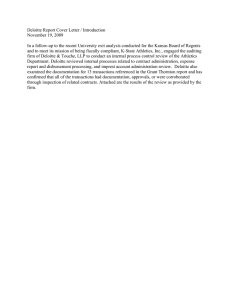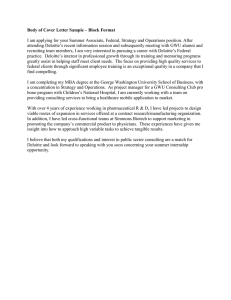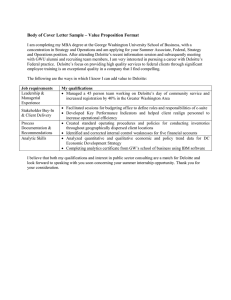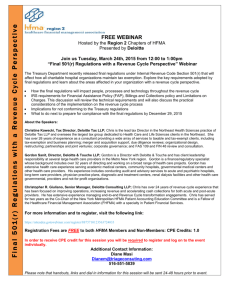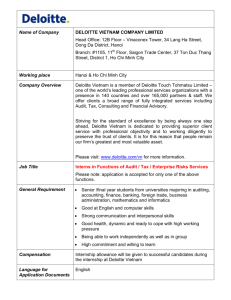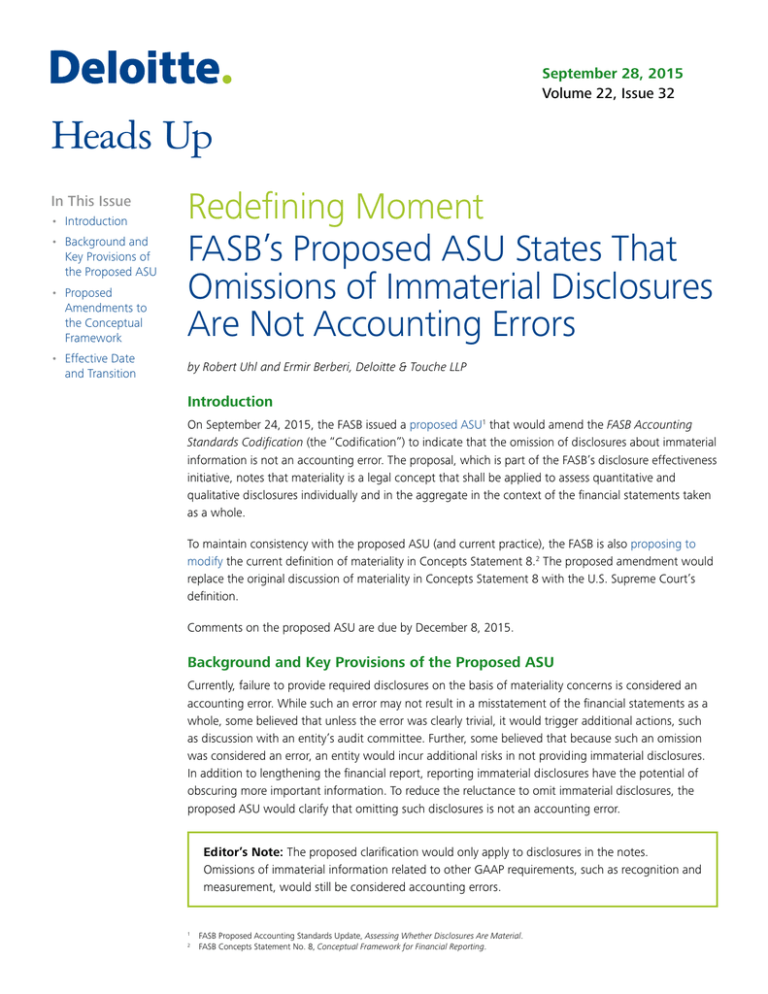
September 28, 2015
Volume 22, Issue 32
Heads Up
In This Issue
• Introduction
• Background and
Key Provisions of
the Proposed ASU
• Proposed
Amendments to
the Conceptual
Framework
• Effective Date
and Transition
Redefining Moment
FASB’s Proposed ASU States That
Omissions of Immaterial Disclosures
Are Not Accounting Errors
by Robert Uhl and Ermir Berberi, Deloitte & Touche LLP
Introduction
On September 24, 2015, the FASB issued a proposed ASU1 that would amend the FASB Accounting
Standards Codification (the “Codification”) to indicate that the omission of disclosures about immaterial
information is not an accounting error. The proposal, which is part of the FASB’s disclosure effectiveness
initiative, notes that materiality is a legal concept that shall be applied to assess quantitative and
qualitative disclosures individually and in the aggregate in the context of the financial statements taken
as a whole.
To maintain consistency with the proposed ASU (and current practice), the FASB is also proposing to
modify the current definition of materiality in Concepts Statement 8.2 The proposed amendment would
replace the original discussion of materiality in Concepts Statement 8 with the U.S. Supreme Court’s
definition.
Comments on the proposed ASU are due by December 8, 2015.
Background and Key Provisions of the Proposed ASU
Currently, failure to provide required disclosures on the basis of materiality concerns is considered an
accounting error. While such an error may not result in a misstatement of the financial statements as a
whole, some believed that unless the error was clearly trivial, it would trigger additional actions, such
as discussion with an entity’s audit committee. Further, some believed that because such an omission
was considered an error, an entity would incur additional risks in not providing immaterial disclosures.
In addition to lengthening the financial report, reporting immaterial disclosures have the potential of
obscuring more important information. To reduce the reluctance to omit immaterial disclosures, the
proposed ASU would clarify that omitting such disclosures is not an accounting error.
Editor’s Note: The proposed clarification would only apply to disclosures in the notes.
Omissions of immaterial information related to other GAAP requirements, such as recognition and
measurement, would still be considered accounting errors.
1
2
FASB Proposed Accounting Standards Update, Assessing Whether Disclosures Are Material.
FASB Concepts Statement No. 8, Conceptual Framework for Financial Reporting.
The proposal further notes that quantitative and qualitative disclosures are assessed for materiality
individually and in the aggregate. Thus, when disclosure requirements are assessed, some, all, or
none of the requirements in a Codification topic may be material. In addition, the proposed ASU’s
acknowledgment that materiality is a legal concept eliminates any potential conflict between
accounting standards and law.
Constituents have also noted that wording of the disclosure requirements in the Codification may be
preventing some from omitting immaterial disclosures. For example, some find phrases such as “an
entity shall at a minimum provide” difficult to overcome. While the proposal did not offer explicit
modifications, the FASB noted that the final standard would contain amendments to replace such
prescriptive language.
Proposed Amendments to the Conceptual Framework
Under the current definition of materiality in chapter 3 of FASB Concepts Statement 8, “[i]nformation
is material if omitting it or misstating it could influence decisions that users make on the basis of
the financial information of a specific reporting entity” (emphasis added). The proposed ASU would
amend this definition to refer to the U.S. Supreme Court’s definition of materiality, which states that
information is material if “there is a substantial likelihood that the omitted or misstated disclosure
would have been viewed by a reasonable resource provider as having significantly altered the total mix
of information available in making a decision” (emphasis added).
While Concepts Statement 8 is not authoritative, the Board decided that the most effective way to
avoid the potential uncertainty or confusion associated with inconsistent definitions was to (1) replace
the original discussion of materiality in Concepts Statement 8 with a statement that the Supreme Court
has provided a legal definition of materiality and (2) include a brief summary of that definition.
Effective Date and Transition
The amendments in the proposed ASU would be effective upon issuance. Reporting entities may
choose to apply this guidance in only the most recent year reported (prospective) or in all years
presented (retrospective).
2
Subscriptions
If you wish to subscribe to Heads Up and other Deloitte accounting publications, please register at www.deloitte.com/us/
subscriptions.
Dbriefs for Financial Executives
We invite you to participate in Dbriefs, Deloitte’s webcast series that delivers practical strategies you need to stay on top of
important issues. Gain access to valuable ideas and critical information from webcasts in the “Financial Executives“ series on the
following topics:
• Business strategy and tax.
• Financial reporting for taxes.
• Driving enterprise value.
• Governance, risk, and compliance.
• Financial reporting.
• Technology.
• Transactions and business events.
Dbriefs also provides a convenient and flexible way to earn CPE credit — right at your desk. Subscribe to Dbriefs to receive
notifications about future webcasts at www.deloitte.com/us/dbriefs.
Technical Library and US GAAP Plus
Deloitte makes available, on a subscription basis, access to its online library of accounting and financial disclosure literature. Called
Technical Library: The Deloitte Accounting Research Tool, the library includes material from the FASB, EITF, AICPA, PCAOB, IASB,
and SEC, in addition to Deloitte’s own accounting and SEC manuals and other interpretive accounting and SEC guidance.
Updated every business day, Technical Library has an intuitive design and navigation system that, together with its powerful
search features, enable users to quickly locate information anytime, from any computer. Technical Library subscribers also receive
Technically Speaking, the weekly publication that highlights recent additions to the library. For more information, including
subscription details and an online demonstration, visit www.deloitte.com/us/techlibrary.
In addition, be sure to visit US GAAP Plus, our free Web site that features accounting news, information, and publications with a
U.S. GAAP focus. It contains articles on FASB activities and updates to the FASB Accounting Standards Codification™ as well as
developments of other U.S. and international standard setters and regulators, such as the PCAOB, AICPA, SEC, IASB, and
IFRS Interpretations Committee. Check it out today!
Heads Up is prepared by members of Deloitte’s National Office as developments warrant. This publication
contains general information only and Deloitte is not, by means of this publication, rendering accounting,
business, financial, investment, legal, tax, or other professional advice or services. This publication is not a
substitute for such professional advice or services, nor should it be used as a basis for any decision or action
that may affect your business. Before making any decision or taking any action that may affect your business,
you should consult a qualified professional advisor.
Deloitte shall not be responsible for any loss sustained by any person who relies on this publication.
As used in this document, “Deloitte“ means Deloitte & Touche LLP, a subsidiary of Deloitte LLP. Please see
www.deloitte.com/us/about for a detailed description of the legal structure of Deloitte LLP and its subsidiaries.
Certain services may not be available to attest clients under the rules and regulations of public accounting.
Copyright © 2015 Deloitte Development LLC. All rights reserved.
Member of Deloitte Touche Tohmatsu Limited.

